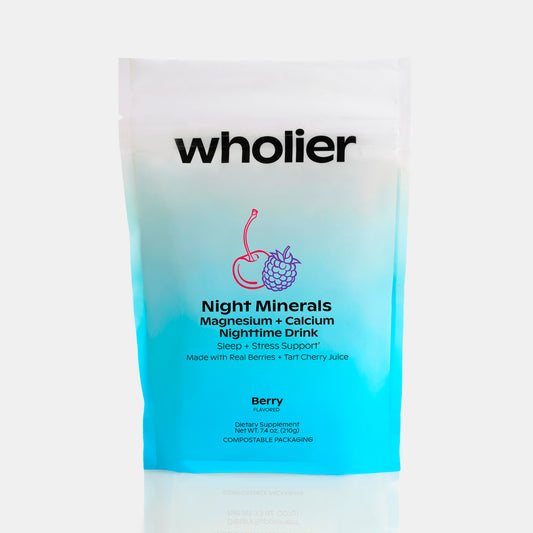
Magnesium vs. Melatonin: The Sleep Showdown
Have you ever found yourself staring at the ceiling, sleep eluding you, as the hours tick by? If so, you're not alone. Many people seek out natural supplements to aid their quest for the ever-elusive peaceful night's sleep. Two names that consistently pop up in these late-night searches are melatonin and magnesium. But which of these sleep aids reigns supreme? Buckle up, it's time to explore these sleep giants, and see why, in the end, magnesium tends to take home the gold.
What Is Melatonin?
Let's start by demystifying melatonin. Often referred to as the "sleep hormone," melatonin is naturally produced by your pineal gland—a pea-sized organ right in the middle of your brain.(1) As daylight fades, melatonin production kicks into high gear, preparing your body for sleep. With the break of dawn, this production decreases, nudging you awake.(2)
How Does Melatonin Support Better Sleep?
Melatonin supplements are popular among people struggling to fall asleep, particularly for those wrestling with insomnia or jet lag.(3) These supplements can help adjust your body's internal clock and hasten the onset of sleep. However, individual responses can be a mixed bag, and melatonin is not without potential drawbacks.
Melatonin's real strength lies in its ability to reset your circadian rhythm, especially beneficial for jet lag sufferers or frequent flyers crossing multiple time zones.(4) Shift workers, whose schedules often disrupt the normal sleep-wake cycle, might also find melatonin beneficial.(5)
However, melatonin use isn't always sunshine and rainbows. Some folks may experience side effects like daytime sleepiness, dizziness, headaches, and even occasional feelings of depression.(6) There's also the possibility of your body becoming reliant on the supplement, which could decrease its natural production of the hormone over time.(7)
What Is Magnesium?
Magnesium, on the other hand, is an essential mineral engaged in over 300 enzymatic reactions within the body. It plays a critical role in everything from immune function and bone health to nerve and muscle function, heart rhythm, and, importantly, sleep.(8)
How Does Magnesium Support Better Sleep?
A considerable body of research suggests that magnesium can significantly improve sleep quality. Known to promote relaxation, magnesium acts as a natural tranquilizer.(9) It's involved in regulating neurotransmitters, which send signals across the nervous system and brain, and it even plays a role in regulating the hormone melatonin.(10)
Research indicates that magnesium can help enhance sleep quality, especially for people suffering from insomnia. One study found that magnesium supplementation improved various subjective measures of insomnia, such as sleep efficiency, sleep time, and sleep onset latency.(11)
Although magnesium is generally safe for most people, it's not without potential side effects, mainly when taken in high doses. Some people may experience diarrhea, nausea, and abdominal cramping.(12) Additionally, individuals with kidney disease should exercise caution when considering magnesium supplements.(13)
Why Is Magnesium A Better Sleep Aid?
So, who emerges victorious in the sleep battle: melatonin or magnesium? While both have their distinct merits, the laurel often goes to magnesium. The reasons are manifold.
Firstly, although melatonin might prove effective for situational sleep issues, like jet lag or shift work, it isn’t typically as beneficial for chronic sleep problems.(14) Conversely, magnesium's impact is broader. It promotes better sleep and plays an integral part in overall health by supporting numerous bodily functions.
Unlike melatonin, magnesium supplementation doesn't affect the body's ability to produce the sleep hormone naturally.(15) This means you're less likelyto develop a dependence on it. Furthermore, magnesium is less likely to produce certain side effects associated with melatonin, such as daytime sleepiness.(16)
Another point in magnesium’s favor is its wide-ranging health benefits. It’s involved in nerve and muscle function, helps maintain a steady heart rhythm, supports a healthy immune system, and aids in keeping your bones strong.(8) This multi-faceted role in overall health and wellbeing makes magnesium a more robust choice in the long term.
In essence, magnesium seems to offer a more comprehensive approach to sleep health. It doesn't just assist in getting you to sleep; it can also improve the quality of your sleep, ensuring that you wake up feeling more refreshed and ready to face the day.
Wrapping it Up: Melatonin or Magnesium?
While melatonin has its place, if you're looking for a natural sleep aid that doesn't risk dependency and offers numerous additional health benefits, magnesium may be your knight in shining armor. It's a natural way to enhance not only your sleep but also your general wellbeing. However, it's worth noting that everyone is unique, and what works for one person may not work for another. It's all about finding what works best for you. Sweet dreams!
Sources:
(1) Claustrat, B., Brun, J., & Chazot, G. (2005). The basic physiology and pathophysiology of melatonin. Sleep Medicine Reviews, 9(1), 11-24.
(2) Arendt, J. (2005). Melatonin: characteristics, concerns, and prospects. Journal of Biological Rhythms, 20(4), 291-303.
(3) Ferracioli-Oda, E., Qawasmi, A., & Bloch, M. H. (2013). Meta-Analysis: Melatonin for the Treatment of Primary Sleep Disorders. PLoS ONE, 8(5), e63773.
(4) Herxheimer, A., & Petrie, K. J. (2002). Melatonin for the prevention and treatment of jet lag. Cochrane Database of Systematic Reviews, (2).
(5) Czeisler, C. A., & Gooley, J. J. (2007). Sleep and circadian rhythms in humans. Cold Spring Harbor symposia on quantitative biology, 72, 579-597.
(6) Andersen, L. P., Gögenur, I., Rosenberg, J., & Reiter, R. J. (2016). The safety of melatonin in humans. Clinical Drug Investigation, 36(3), 169-175.
(7) Brzezinski, A., Vangel, M. G., & Wurtman, R. J. (2005). Effects of exogenous melatonin on sleep: a meta-analysis. Sleep Medicine Reviews, 9(1), 41-50.
(8) de Baaij, J. H., Hoenderop, J. G., & Bindels, R. J. (2015). Magnesium in man: implications for health and disease. Physiological Reviews, 95(1), 1-46.
(9) Nielsen, F. H., Johnson, L. K., & Zeng, H. (2010). Magnesium supplementation improves indicators of low magnesium status and inflammatory stress in adults older than 51 years with poor quality sleep. Magnesium research, 23(4), 158-168.
(10) Sartori, S. B., Whittle, N., Hetzenauer, A., & Singewald, N. (2012). Magnesium deficiency induces anxiety and HPA axis dysregulation: Modulation by therapeutic drug treatment. Neuropharmacology, 62(1), 304-312.
(11) Abbasi, B., Kimiagar, M., Sadeghniiat, K., Shirazi, M. M., Hedayati, M., & Rashidkhani, B. (2012). The effect of magnesium supplementation on primary insomnia in elderly: A double-blind placebo-controlled clinical trial. Journal of Research in Medical Sciences: The Official Journal of Isfahan University of Medical Sciences, 17(12), 1161.
(12) Firoz, M., & Graber, M. (2001). Bioavailability of US commercial magnesium preparations. Magnesium research, 14(4), 257-262.
(13) Martin, K. J., & González, E. A. (2009). Metabolic bone disease in chronic kidney disease. Journal of the American Society of Nephrology, 20(5), 1029-1038.
(14) Rajput, R. S., & Bhatt, R. K. (2015). Management of insomnia in patients with chronic kidney disease. Saudi Journal of Kidney Diseases and Transplantation, 26(3), 619.
(15) Rondanelli, M., Opizzi, A., Monteferrario, F., Antoniello, N., Manni, R., & Klersy, C. (2011). The effect of melatonin, magnesium, and zinc on primary insomnia in long-term care facility residents in Italy: a double-blind, placebo-controlled clinical trial. Journal of the American Geriatrics Society, 59(1), 82-90.
(16) Durlach, J., Pagès, N., Bac, P., Bara, M., & Guiet-Bara, A. (2002). Biorhythms and possible central regulation of magnesium status, phototherapy, darkness therapy and chronopathological forms of magnesium depletion. Magnesium research, 15(1-2), 49-66.





